Flat Jane Austen in Rhode Island:
In which she learns of a Traitor
and the Industrial Revolution
Mr. S. Brown referred Mr. Slater to the Wilkinson family. There Mr. Slater was introduced to David Wilkinson, a young machinist and inventor who helped build Mr. Slater a carding machine to straighten the cotton. Mr. Slater had difficulty reproducing what he knew as the bog iron from the American rivers shrunk more than English iron.
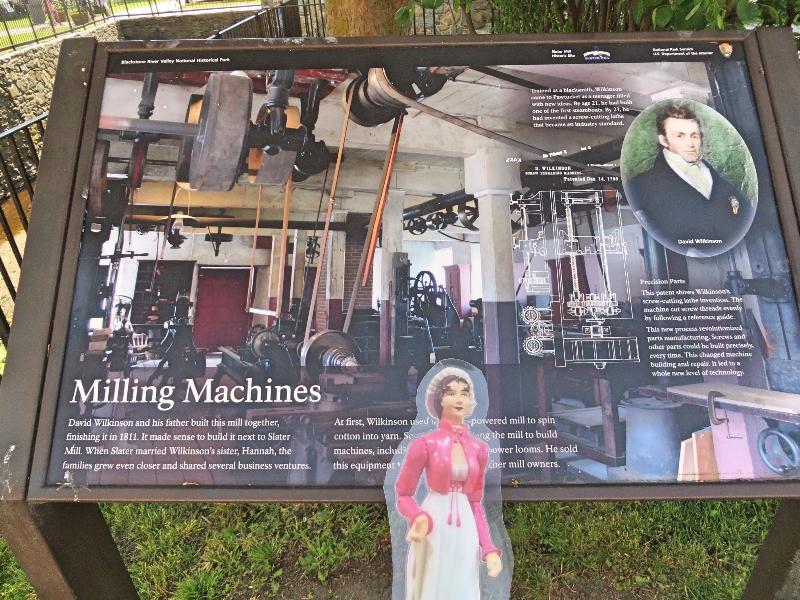
Jane learns about machinist and inventor David Wilkinson
Mr. Oziel Wilkinson and his sons opened a machine shop recently in the year 10. It features a small water wheel with a backup steam engine in the basement. Inside they make machines and machine parts for Almy, Brown and Slater (named for Mr. Moses Brown, his son-in-law William Almy and Mr. Slater) and other mills springing up in this direction. Upstairs the women weave on power looms. Americans seem to have more success and interest in steam power than we do.
The Blackstone River is the key to the success of the mills. The river begins in northwest Massachusetts, in a place called Worcester, just like our Worcester . This American Worcester is situated 479 feet above sea level! The water flows from the mountains down to Pawtucket, a distance of 46 miles. The Pawtucket Falls is at the end of the river 440 feet below where the river started. This word, Pawtucket, is an Indian word which means "place where water falls." The heavy drop makes for a faster water flow.
View a virtual tour of the Pawtucket Falls with a National Park Service ranger.
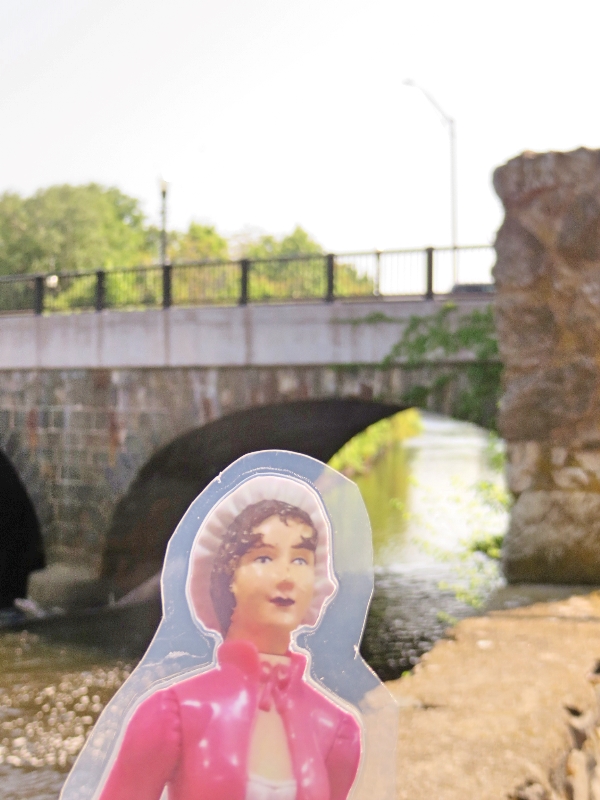
The Pawtucket Falls flows under the Main Street
Bridge (built after Jane's time in 1858). She sees
a wooden bridge across the river.
The water flows to the mills from the dam built on the Blackstone River by Mr. Slater. It blocks the water from flowing forth too freely, infuriating the local farmers who destroyed the first dam. On top of the dam is the mill pond from which the mills draw their water.
 |
| Jane learns about machinist and inventor David Wilkinson |
The Blackstone River is the key to the success of the mills. The river begins in northwest Massachusetts, in a place called Worcester, just like our Worcester . This American Worcester is situated 479 feet above sea level! The water flows from the mountains down to Pawtucket, a distance of 46 miles. The Pawtucket Falls is at the end of the river 440 feet below where the river started. This word, Pawtucket, is an Indian word which means "place where water falls." The heavy drop makes for a faster water flow.
View a virtual tour of the Pawtucket Falls with a National Park Service ranger.
 |
| The Pawtucket Falls flows under the Main Street Bridge (built after Jane's time in 1858). She sees a wooden bridge across the river. |
The water flows to the mills from the dam built on the Blackstone River by Mr. Slater. It blocks the water from flowing forth too freely, infuriating the local farmers who destroyed the first dam. On top of the dam is the mill pond from which the mills draw their water.
The water from the mill pond flows into the head gate here. The head gate can be manually raised and lowered to control the flow of the water. From the head gate, it flows to the head race it flows into the Great Flume (raceway) which flows under both Almy, Brown and Slater's (yellow) mill and Wilkinson's mill.
At the end of the Great Flume is the water wheel pit.
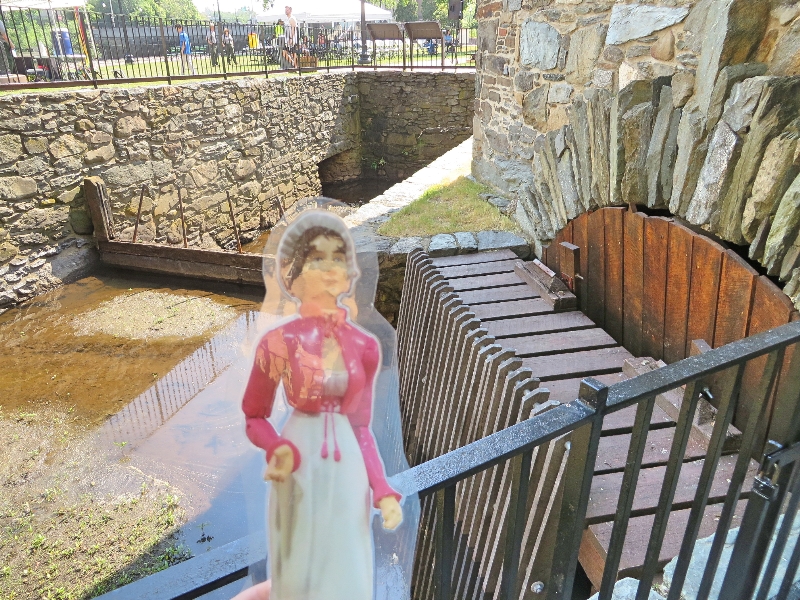
Giant metal pins are used to open and close the gate to allow water
to flow through and turn the wheel.
The water flows under the wheel filling a few buckets at a time. 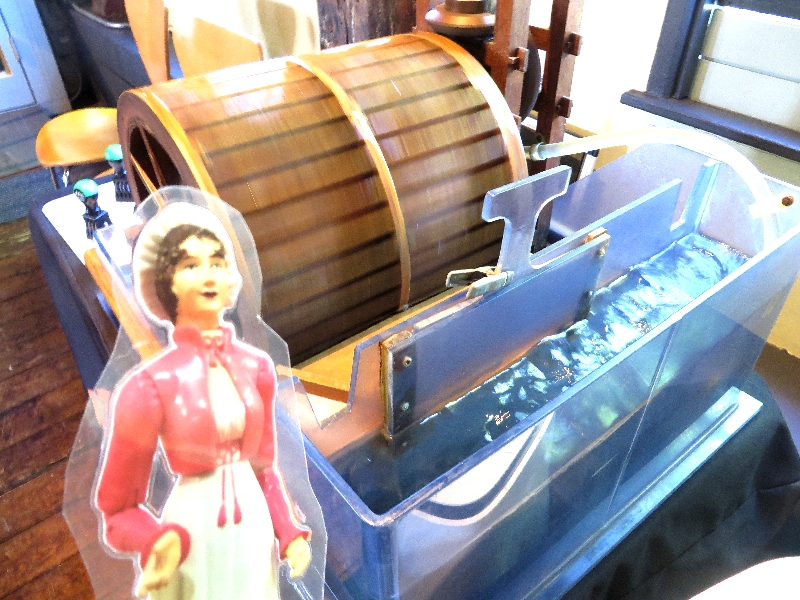
Water from the mill pond flows into the raceway.
The gate is raised to allow the water to flow.
Today the gate is partially raised to allow a moderate flow.
The weight of the water pushes the wheel backwards.
The wheel turns the drive shaft (axis pole), which turns the two sets of gears at the top.
The drive shaft continues up through the ceiling to the mill floors all the way up. Attached is another horizontal pole, the line shaft, and attached to that is a series of metal gears and leather belts which turn the machinery.
The Wilkinson Mill has separate levers to turn individual machines on or off. They have wood working machines and metal working machines. Mr. David Wilkinson is said to have invented something called a screw lathe. He enjoyed inventing and using steam power. Editor's note: The Editor's former colleague, Mr. Carl L. Johnson, demonstrates the wheel and machinery
Take a virtual tour of the Wilkinson Mill with the National Park Service.
Editor's Note: Flat Jane would like to acknowledge the Indians on whose land the Blackstone Valley National Historic Park sits on. The Nipmuk, Narragansett and Wampanoag have made their home here for thousand of years.
Please turn the page
The water from the mill pond flows into the head gate here. The head gate can be manually raised and lowered to control the flow of the water. From the head gate, it flows to the head race it flows into the Great Flume (raceway) which flows under both Almy, Brown and Slater's (yellow) mill and Wilkinson's mill.
At the end of the Great Flume is the water wheel pit.
 |
| Giant metal pins are used to open and close the gate to allow water to flow through and turn the wheel. |
The water flows under the wheel filling a few buckets at a time.
 |
| Water from the mill pond flows into the raceway. The gate is raised to allow the water to flow. Today the gate is partially raised to allow a moderate flow. |
The weight of the water pushes the wheel backwards.
The wheel turns the drive shaft (axis pole), which turns the two sets of gears at the top.
The drive shaft continues up through the ceiling to the mill floors all the way up. Attached is another horizontal pole, the line shaft, and attached to that is a series of metal gears and leather belts which turn the machinery.
The Wilkinson Mill has separate levers to turn individual machines on or off. They have wood working machines and metal working machines. Mr. David Wilkinson is said to have invented something called a screw lathe. He enjoyed inventing and using steam power.
Editor's note: The Editor's former colleague, Mr. Carl L. Johnson, demonstrates the wheel and machinery
Take a virtual tour of the Wilkinson Mill with the National Park Service.
Editor's Note: Flat Jane would like to acknowledge the Indians on whose land the Blackstone Valley National Historic Park sits on. The Nipmuk, Narragansett and Wampanoag have made their home here for thousand of years.
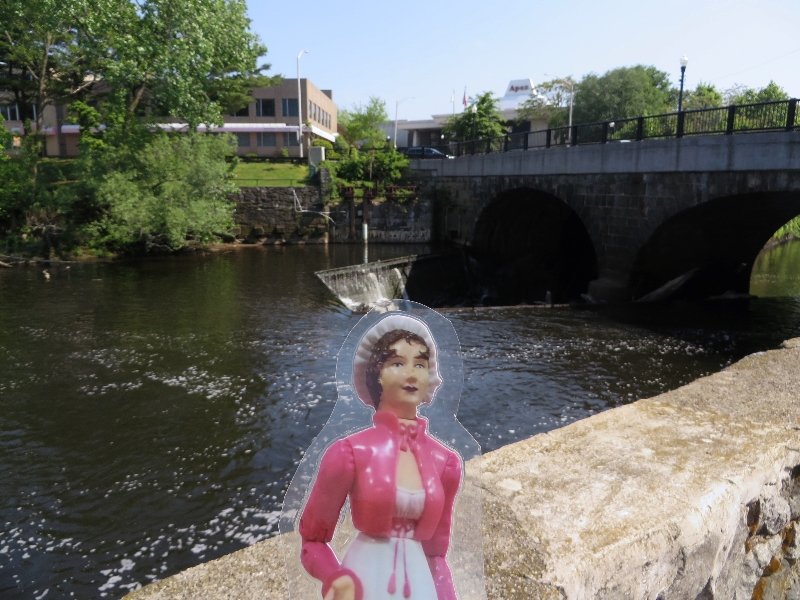






No comments:
Post a Comment